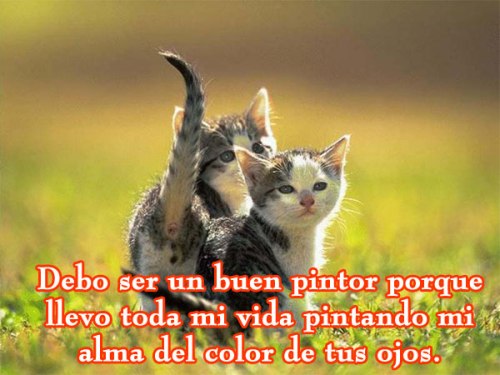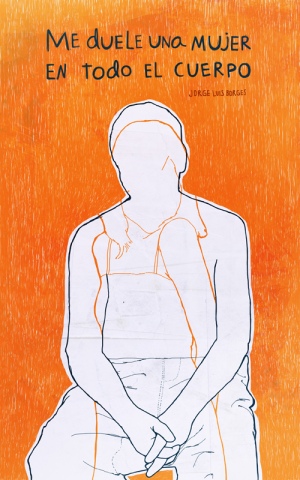First things first. A piropo is a flirtatious, admiring compliment in Spanish, they thrive on the streets of Latin America, and while some may consider them annoying or even verbal assault, others consider them an art form. As a verb, you can say echar un piropo or piropear. Yes, piropos often have the reputation of just being sleazy pickup lines. They don’t have to be, though; they can be an amorous compliment y ya, nada más y nada menos.
I always kind of wanted to write a blog post on Spanish catcalls in the street. I dreamed up assignments of traversing Latin America’s alleys and avenues and reporting on what the men were saying in El Salvador, the heights and depths of creativity in Chile, the levels of desperation in Puerto Rico, the poetry of the side streets of Bolivia. People talk about learning Spanish that’s more de la calle, and I remember once having a book called Streetwise Spanish (alas, lost in the great taxi heist of 2010)– what could be more callejero than piropos? While there are surely many nasty, creepy, and wildly inappropriate comments made to women in the streets, many beautiful and lyrical compliments are paid as well. It could be a pain walking around in Colombia, no doubt–sunglasses, a quick pace, and a menacing, no me jodas look were my friends. I also know that my imperfect Spanish comprehension shielded me from many things that were spoken too fast or mumbled too pasito for me to catch them. In general, I gave groups of men as wide a berth as possible, especially the omnipresent construction workers. All that to say that I was probably protected from the most lecherous comments. Still, I defend piropos in general. It all depends on who’s administering them.
What woman can say that a really charming and reverential piropo launched when she was least expecting it hasn’t made her day at one point or another? Most of what was said to me was highly respectful or, failing that, at least flattering. Look, my ego isn’t made of steel. Even the most hackneyed lines would often give me a small pep in my step, and I’d be lying if I said I don’t miss them. Most piropos ran along the lines of something like:
¡Estás bueeeeeeeeeena!
Uy, ¡mamasota!
Qué nena tan linda.
Uy, qué guapa.
Eres la mujer más bonita en toda la ciudad. Buenas tardes.
Sssssssssss.
You get the picture. And then there were two red-letter days, two piropos that made me beam inside for a good couple hours.
Eres un poema visual. (On the street)
Para mis ojos, tu hermosura es perfecta. (I was sitting at a café in Bogotá reading Cien años de soledad.)
The best piropo of my life, however, didn’t happen in Colombia. It wasn’t even in Spanish. It was right here in my city on a fall Sunday afternoon much like this one five years ago. I’d been scrunched up on a bench in front of a café for a few hours furiously reading Faulkner’s Absalom, Absalom! All of a sudden, an older man (they’re always older men) came up, nonchalantly handed me a small slip of paper, and walked away.
Not hitting on you. Not even leaving my name. Just know this: you are absolutely beautiful. I hope you are acting or modeling. Go well.
I was woozy for weeks.
But enough about me and some of the kind things strangers have felt compelled to say to me. What about you? What piropos have you received? What piropos have you delivered? What piropos would you give out if only you had the guts to do so? Hmm. I am a strong believer in remarking on beauty when it strikes you, when it catches you unawares, when it overwhelms you to the point that it hurts just a little to take it all in. I want to give out piropos, I do. So I shall, somehow. To someone. Somewhere. All he has to do is walk by me.
How you go about constructing your piropos is your business, your prerogative. The idea is originality, which doesn’t have to mean spontaneity. The dear, bumbling Mr. Collins in Pride and Prejudice had some wise words on this point.
“. . . I am happy on every occasion to offer those little delicate compliments which are always acceptable to ladies . . . These are the kind of little things which please her ladyship, and it is a sort of attention which I conceive myself peculiarly bound to pay.”
“You judge very properly,” said Mr. Bennet, “and it is happy for you that you possess the talent of flattering with delicacy. May I ask whether these pleasing attentions proceed from the impulse of the moment, or are the result of previous study?”
“They arise chiefly from what is passing at the time, and though I sometimes amuse myself with suggesting and arranging such little elegant compliments as may be adapted to ordinary occasions, I always wish to give them as unstudied an air as possible.”
As unbearable as that creature was, there is a measure of insight in what he had to say–it is best that your piropos don’t sound canned. I will be more than a little devastated if hundreds of you respond to say that you received that same slip of paper while reading at a coffee shop. You will have to work on making your piropos elegant and delicate; they should nacerte, that is, flow out of you. In the meantime, here are a few basics for talking about beauty in Spanish.
For women:
linda, bonita, hermosa, divina, guapa, atractiva, bella, preciosa, (estar) buena, sexy, despampanante (stunning), una muñeca, una princesa, una reina
Those are just a few of the words that should work everywhere, and every city and country has its regional descriptors as well. For example, churra and chusca are very popular in Colombia; there’s also pispa in Medellín and chirriada in Bogotá. (though I think that’s old-fashioned) And un bizcocho (cake) is a beautiful woman (un bagre [catfish] is an ugly one).
My friend Rafael is convinced that I’m an angel fallen from heaven, and he’s been telling me so in long, lavish, strictly respectful, strictly-as-a-friend messages for years. He loves to say swoony things to me like:
Hola, ¿cómo estás aparte de bella, dulce y sonriente, preciosura?
Y vos, ¿cómo está la chica más linda del vecindario, la que da alegría a todo mundo con su linda sonrisa y su angelical cara?
Hola bella damisela.
Hola dulce y elegante flor de primavera, que por la primavera haces botón, por el verano floreces y en el otoño nos das de tu perfume y por invierno tu delicadeza.
Hola bella fémina.
Hola bella y gentil dama.
He’s Mexican, but he also does his best to woo me in Colombian Spanish.
¡Quiubo, parce!
Pues, de una, parcera.
Con mucho gusto te colaboro, bizcocho.
¿Cómo estás hoy día, bella paisa?
Turning the adjectives into nouns, he’ll also talk about my belleza, dulzura, gentileza, nobleza and grandeza for a change. There’s also hermosura, preciosura, and a word I learned just today– lindura. From the DRAE, lindura–1. Cualidad de lindo; 2. Persona o cosa linda. Good to know.
These are just some of the piropos that haven’t worked on me (although they certainly charmed me). Imagínense the ones that have.
For men:
guapo, lindo, apuesto, buen mozo, (estar) bueno, simpático
In Colombia, they also say churro, chusco, pinta, chirriado as well as many other words I either never learned or have forgotten.
Long live piropos! When done right, they can be so musical, so poetic, so galvanizing. Now I walk down the street and everything’s silent; if I walk down a major road, all I get are prosaic honks. I drive most places, and cars are not exactly piropo-friendly. I just got a bike, though, so maybe some gallant, some knight in a shining Armada will valiantly stick out his neck to pay me a long overdue piropo. And, smitten, of course I’ll pay him one right back.
(I haven’t forgotten about that second load of laundry, btw. Still working on it.)
What about you? What piropos have you received or doled out? Are you a fan of them, or do you despise them? If you’re a native Spanish speaker, anything to correct, clarify, comment on or concur with? What other general and country-specific vocabulary can you teach us for describing other people’s good looks?











Piropos, I love it! Great post Katie, I think I will be jotting a few of these down.
I’ll also add that piropos aren’t always so sweet and romantic. Here’s one of my favorites:
Tantas curvas y yo sin frenos
I actually wrote about this topic myself for those of you who’d like a different perspective on piropos.
http://myspanishnotes.blogspot.com/2010/11/tantas-curvas-y-yo-sin-frenos.html
LikeLike
Thanks! Of course, toda la razón. They are definitely not always sweet and romantic! While searching for images, I saw lots of, ahem, piropos verdes. And many are mixes of the two. Maybe I just figured my brilliant, intelligent, thoughtful readers probably weren’t the types to fling out raunchy piropos in the streets. (Not that I consider the example you gave to be raunchy at all– that is very tame!)
LikeLike
Not sure my wife wants me practicing this skill too often (Except with her of course, and english works best with her). Fantastic read though. Thanks
LikeLike
I think it’s very appropriate to give piropos to one’s spouse! Necessary, even. Say them to her in your sexiest Spanish accent, and then provide the translation. (She may not even care what you’re saying to her– I’m sure your message and intent will be clear.) Thanks for being a fantastic reader over all these months :)
LikeLiked by 1 person
Depends on the day…Sometimes I’ve annoyed her by replying in Spanish all day, that I need to avoid spanish piropos. Other days, she likes it.
As for reading….How could I not enjoy your reading. Even if it was about something I wasn’t into, I would still enjoy it.
LikeLike
You are so kind. Your sweet comment really made my day. Thank you :)
LikeLike
Interesting post, Vocabat, and you are right that men need instruction in piropos. Too many don’t know where to draw the line between a compliment and abuse. There was a huge controversy in Europe this past year after a woman taped the piropos verdes she received on a regular basis as she walked in Brussels. (Here’s a link to the story: http://www.guardian.co.uk/world/2012/aug/03/belgium-film-street-harassment-sofie-peeters ). Piropos verdes are not only insulting to the individual, but they sadly create a cold city of fear that causes people to erect walls around each other and that destroys the beauty of our natural flirtatiousness. One response, the burka, creates walls between the sexes that suppresses women in the name of protection, while in the US we’ve created our own mobile walled communities by driving everywhere. Sadly, few people experience the warmth of walking in a city of natural friendliness and flirtatiousness without fear. I’m sure that in such a city you would never lack for warm smiles and piropos, but I also wonder how it would be to live in that city where others always get them but you never receive them. The best ones are the subtle ones, I think.
LikeLike
Thanks for your comment. Yes, I am well aware of the controversy, and I watched that video a few months ago. It’s true– far too many men hurl out abusive comments on the streets, and it’s sad, disgusting, and very disheartening. I don’t think that takes away from the charm of the true compliments, though. Burqas are definitely not the answer. Education is, as always, both for kids and adults. As for only others getting them but you never receiving them, I guess we all know that we’ve all got different assets, and society appreciates certain ones and is an idiot about others. One doesn’t really hope/expect to be called out on their “Nice brains!” or “Nice noggin!” on the street, do they? I’m sure their multiple degrees and grants and fellowships and high-profile career and sky-high salary and esteem from colleagues are a million times more satisfactory than some stranger yelling out something about their looks. Subtlety isn’t very appreciated either, unfortunately, so you might have to force yourself to be a bit “obvious” if you want to get a message across.
LikeLike
Ohhhh, piropos. Probably my least favorite part of living in Latin America — or at least in Buenos Aires, where they could be really dirty and occasionally even kind of aggressive. Here in Bogotá, they tend to be, like you said, much less intense. Usually just something along the lines of “Hola, princesa” — nothing like the variations on “nice tits” I heard in BA.
I think my favorite Colombianism, though, is “¿Quién pidió pollo?” in which the aforementioned pollo is an attractive person who has just passed by. It’s funny, colloquial, non-gender-specific, and about as non-threatening as it gets (who’s intimidated by a chicken?). One of my very charming co-workers said this to me one morning when I decided to act like an adult and wear a dress, and it had me giggling all day.
Piropos, like bad pick-up lines, are all about how you use them.
LikeLike
Thanks for the comment, Natalie. I’m sorry to hear that they were uglier in Buenos Aires. I like being on the receiving end of flattering piropos, but a la hora de defenderlos, I feel kind of conflicted (as well as a little ashamed for liking them so much). If only I could mandate that people only say nice things. Should all comments be outlawed then? Is it better that we just all say nothing at all? And what about women who aren’t graced with stereotypically good looks? Fat women? What about women who dress like men/boys? Transgendered women? Yeah, it gets really tricky, and I don’t want to be self-absorbed about the issue just because I’m kind of vain and I’m the object of the “good” piropos.
Maybe they just don’t have a place on the streets but should be more something said by conocidos— friends, family members, coworkers. That’s more of the kind of piropos I was describing in this post. Not the witty, crass, can-I-get-your-number pick-up lines but rather the sweet nothings that can really make someone’s day.
Speaking of Quién pidió pollo?, have you watched that standup comedy routine by Antonio Sanint? It’s a classic down there, and it’s very funny!
LikeLike
I like this post. Piropos are one of my favorite things to ponder, and I haven’t come to a decision, yet, about what their place ought to be. Blah blah. But for now, some of these piropos (esp. the first one by Rafael & “¿Quién pidió pollo?”) made me laugh — out loud. I’m so glad you’re keeping all of them. They belong in your memoir!!
Like glances, verbal gestures depend so much on an inner motive … I think. You can tell a leer from admiration. And admiration is one of the wonders of the world — how lovely to occasionally be the object. Though I must say you’ve had more than your fair share. Please start referring piropos to me at my Overton Place address poste-haste. ;)
LikeLike
This is my memoir!! You’re reading it (as well as very much a part of it) :)
Sadly, the inner motives of many, at least the ones who feel compelled to yell their opinion to a stranger, are not lovely. Leering is one problem; other people are downright cruel. Those things are not fair, but neither is life. I think we can still revel in the lovely things that do get said.
You, girl, will be receiving a PIROPO-GRAM ASAP.
Also, I totally only had that Mr. Collins quote on my mind because of our conversation last week. Thanks for letting me use it and not getting in a huff about the lack of credit. That too will find its way into the PIROPO-GRAM coming your way.
Or maybe it should be the PIROPO-GRAMA? Or the PIROPO-GRAMÁ.
LikeLike
Also, I would just like to tell you how happy it makes me that, even though you don’t speak Spanish, you read my blog and interact with the community here. It means a lot to me that you take the time to look the phrases up (Google Translate, I presume?). This is a boon for all of us because you always have such interesting, rich comments. Gracias!
LikeLike
Pingback: Good Luck for Writers « What While We Slept
De nada. I love it, and I learn so much. Looking forward to the Piropo-Gram!!!
LikeLike
I don’t see how you would get time to get these lines out before someone had passed by! From a male perspective there is nothing more satisfying than seeing that look of pleasure when you tell a girl that you like her shoes (one of my favorites) or that she is looking very pretty today.
BTW, telling a man that he looks handsome/rugged/charming goes a long way…
Thanks again for another great post :)
LikeLike
Handsome! Rugged! Charming! OK, I will do everything I can to tell the next handsome man who crosses my path how I feel about him.
How nice to hear that you can appreciate good shoes. You should have seen me in my brown suede knee-high high-heeled boots last night :)
LikeLike
que linda pinta guapita!!
LikeLike
Gracias! :)
LikeLike
esta blog me recuerda a mi frase favorito de Bolivia… Cuando alguien ha echado un piropo genial, las chicas respondieron con por supuesto y una sonrisa astuto…. que guay!
LikeLike
¡Qué guay!
Amigo, te voy a compartir esta entrada mía sobre el verbo recordar porque me fijé en un pequeño error en lo que escribiste, ojalá te sirva: http://vocabat.com/2012/09/01/you-remind-me-of/
LikeLike
Gracias
LikeLike
Primera vez que entro a tu blog y me gustó mucho. Felicidades
LikeLike
Muchísimas gracias, Stefanie. Espero leer más comentarios tuyos en el futuro.
LikeLike
Pingback: Fuera | Vocabat
Pingback: Wink wink nudge nudge | Vocabat